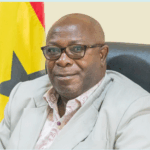
The Acting Deputy Director-General of the National Council for Curriculum and Assessment (NaCCA), Justice Ray Achoanya Ayam, has rejected a directive from the Ghana Tertiary Education Commission (GTEC) to stop using his academic title “Dr.”, arguing that his doctoral qualification from the Swiss Management Centre (SMC) University remains valid and legally recognised.
In a detailed response dated November 11, Mr. Ayam said he would continue to use the title until a competent court rules otherwise.
“Accordingly, and until a court of competent jurisdiction rules otherwise, I am unable to comply with the Commission’s directive,” he stated. “I shall, in good faith and consistent with NAB’s 2020 affirmation, continue to use the academic title ‘Dr.’ — a title reflecting a validly earned, lawfully conferred, and previously recognised doctoral qualification.”
He maintained that his degree was properly obtained and had earlier been recognised by Ghana’s former regulatory body, the National Accreditation Board (NAB), before it was merged into GTEC.
Mr Ayam said his position was grounded in fairness, legality, and due process. “I wish to respond respectfully yet firmly, guided by the principles of administrative fairness, consistency, legality, and due process as enshrined under the Education Regulatory Bodies Act, 2020 (Act 1023),” he wrote.
He questioned GTEC’s consistency, pointing out that the Commission had only recently validated a similar SMC doctoral credential.
“GTEC, under your leadership, has previously issued a formal attestation validating a similar SMC doctoral credential awarded to Mr Kingsley Kwesi Kwabahson,” he noted. “It is therefore procedurally inconsistent and administratively untenable for GTEC to now declare that all certificates issued by SMC are invalid.”
Mr Ayam also dismissed GTEC’s suggestion that the difference between “Doctorate of Business Administration” and “Doctor of Business Administration” had any bearing on the validity of his qualification.
“The attempt to distinguish between the two is academically misconceived and linguistically unfounded,” he argued. “The two expressions are semantically and functionally interchangeable within global higher education practice.”
Addressing what GTEC described as “irregularities” in his transcript, he explained that SMC operates under the European Credit Transfer and Accumulation System (ECTS), which differs from Ghana’s credit system.
“Totals exceeding 600 credits are both standard and valid under that framework,” he said, adding that the grading format and thesis coding on his transcript followed international norms and could not be considered fraudulent or inaccurate.
READ ALSO: GTEC directs NaCCA Deputy Director-General to cease using invalid SMC ‘Dr’ title
On the use of the names “Swiss Management Centre” and “SMC University”, he said both referred to the same institution. “The use of both names interchangeably in documentation reflects legitimate institutional evolution, not inconsistency or fraud,” he clarified.
Mr Ayam further reminded GTEC that NAB had previously stated in a 2020 notice that all students who enrolled at SMC before 31 August 2018 possessed valid and recognised qualifications, unless proven otherwise.
He therefore requested that GTEC disclose any expert committee reports or official resolutions that may have overturned NAB’s earlier recognition. “In the absence of such disclosure, the current directive may be deemed arbitrary, ultra vires, and contrary to the doctrine of legitimate expectation recognised under Ghanaian law,” he stated.
Citing Section 70(1) of Act 1023, Mr Ayam concluded that GTEC has no legal authority to retroactively invalidate academic qualifications that were lawfully earned under a previously competent regulatory body. “No provision within Act 1023 confers upon the Commission the power to unilaterally invalidate academic credentials retrospectively without due statutory process,” he said.
He reaffirmed his readiness to cooperate with GTEC but insisted on defending his rights. “I remain committed to cooperating with the Commission in the spirit of transparency, fairness, and respect for institutional integrity, while reserving all legal rights and remedies available to me under Ghanaian law,” he stated.



